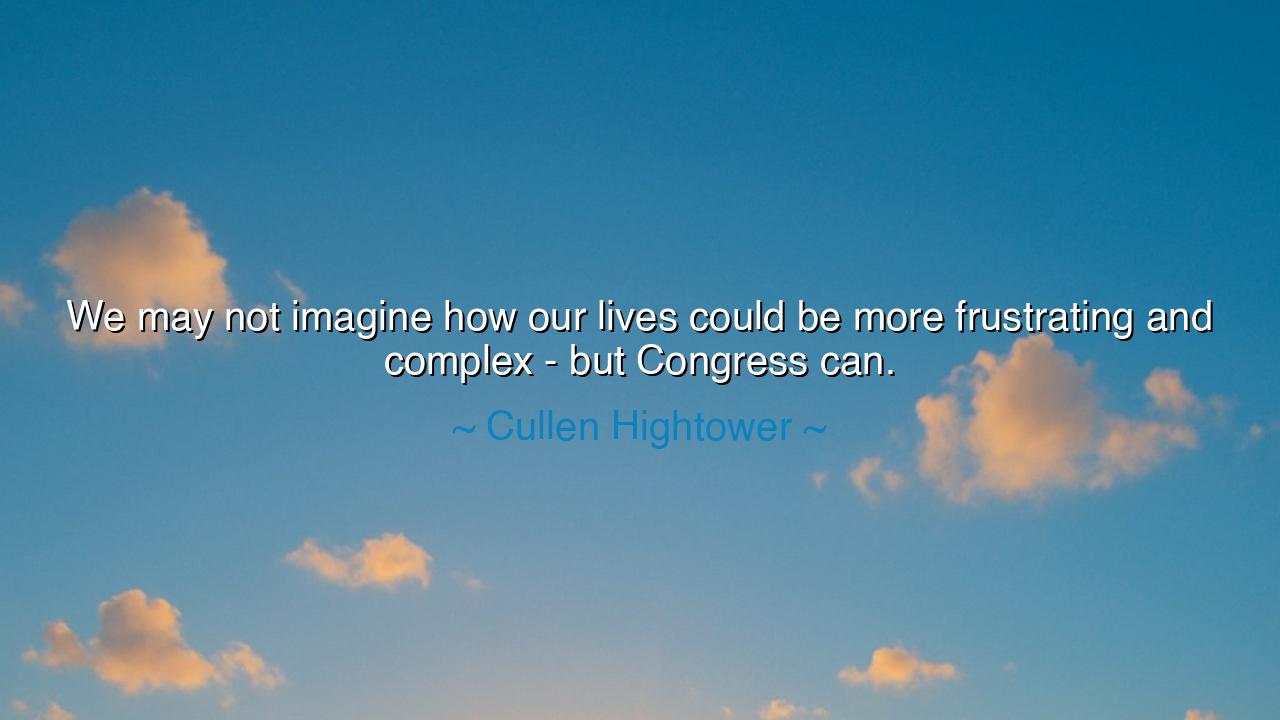
We may not imagine how our lives could be more frustrating and
We may not imagine how our lives could be more frustrating and complex - but Congress can.






The humorist Cullen Hightower, with his sharp wit and timeless insight into the follies of human institutions, once said: “We may not imagine how our lives could be more frustrating and complex – but Congress can.” At first hearing, this sounds like jest, a mere satire on politics and bureaucracy. Yet beneath its laughter lies a truth older than empires—a truth about power, governance, and the eternal tension between the rulers and the ruled. Hightower, like the philosophers of old, used humor as a blade to cut through pretense. His words remind us that when the human hand reaches too eagerly to control and correct, it often entangles the world in needless complexity, turning what is simple into confusion, and what is natural into burden.
For what is Congress, in its essence, but a gathering of men and women who seek to order the affairs of others? From the dawn of civilization, wherever authority gathers, so too gathers the temptation to meddle, to overgovern, to legislate beyond wisdom. Hightower’s saying may have sprung from the American halls of power, but its spirit echoes through all ages. In ancient Rome, the Senate passed law upon law until the common citizen could no longer live without violating some decree. The poet Juvenal wrote that the laws grew like weeds in a garden unkept. And indeed, as the centuries march forward, the more humanity seeks to refine the machine of governance, the more that machine seems to creak and shudder under the weight of its own ambition.
Hightower’s humor pierces the heart of bureaucracy, that great and lumbering beast which devours the time, energy, and patience of nations. To those who live under its shadow, each new rule or regulation feels like a thread—light at first, but soon woven into a web from which escape is impossible. The citizen only wishes to live, to work, to build, to raise his children in peace; yet the machinery of law insists on forms, approvals, licenses, and taxes, until even the simplest act feels fraught with confusion. Thus, Hightower’s wit conceals a warning: that the complexity of law, though born of reason, often strangles the reason it was meant to serve.
Consider the story of the French Revolution, when in the name of liberty, men sought to rebuild their society from the ground up. Committees were formed, decrees were written, systems were planned to free the people from tyranny. Yet soon those same structures became prisons of thought and control. The Reign of Terror was not born in chaos but in the feverish belief that perfection could be legislated—that through law alone, the human heart could be purified. Hightower’s modern jest whispers the same ancient lesson: that governance, when divorced from humility, becomes its own tyranny—not of swords, but of paper, ink, and procedure.
And yet, the quote is not merely an indictment of rulers—it is a mirror held to society itself. For Congress, or any governing body, reflects the people who choose it. The tendency to complicate life, to demand new rules for every discomfort, lies also within us. We cry out for safety, for order, for fairness, and each cry births another law, another regulation, another layer upon the once-living fabric of freedom. We become participants in our own frustration, mistaking governance for goodness, and control for wisdom. Hightower’s humor thus turns inward, reminding us that simplicity—in thought, in action, in government—is not a sign of ignorance, but of clarity.
The ancients taught that the best rulers were those who governed least, for they trusted the virtue of their people more than the machinery of law. Lao Tzu said, “The more laws and restrictions there are, the poorer the people become.” And indeed, in every age, wisdom has whispered that the highest order is born not of excessive structure, but of balance—of trust between ruler and citizen, of restraint between authority and freedom. The greatest leaders understand that to lighten the burdens of their people is a nobler act than to add to them. They know that order without understanding is a cage, but order with compassion is civilization.
So, my listener, hear the lesson that hides beneath Hightower’s laughter: beware the temptation to make life more complex than it need be. In your own sphere—your home, your work, your community—resist the urge to overgovern, to overthink, to overcontrol. Seek instead the elegance of simplicity, the grace of common sense. Let your words be few, your rules be clear, and your heart be generous. Remember that no great system has ever perfected humanity, but that humanity can ennoble any system—if it remembers to remain free, honest, and kind.
And in this spirit, we may smile at Hightower’s jest, yet take it to heart as ancient wisdom in modern form. For though kings and councils may rise and fall, the truth remains: the world is not perfected by adding more laws, but by deepening our understanding of one another. When man learns this, his life will no longer be so “frustrating and complex”—and perhaps then, at last, he will no longer need Congress to imagine new ways to make it so.






AAdministratorAdministrator
Welcome, honored guests. Please leave a comment, we will respond soon